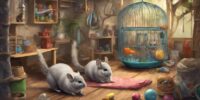What Is the Typical Lifespan of Domestic Chinchillas?
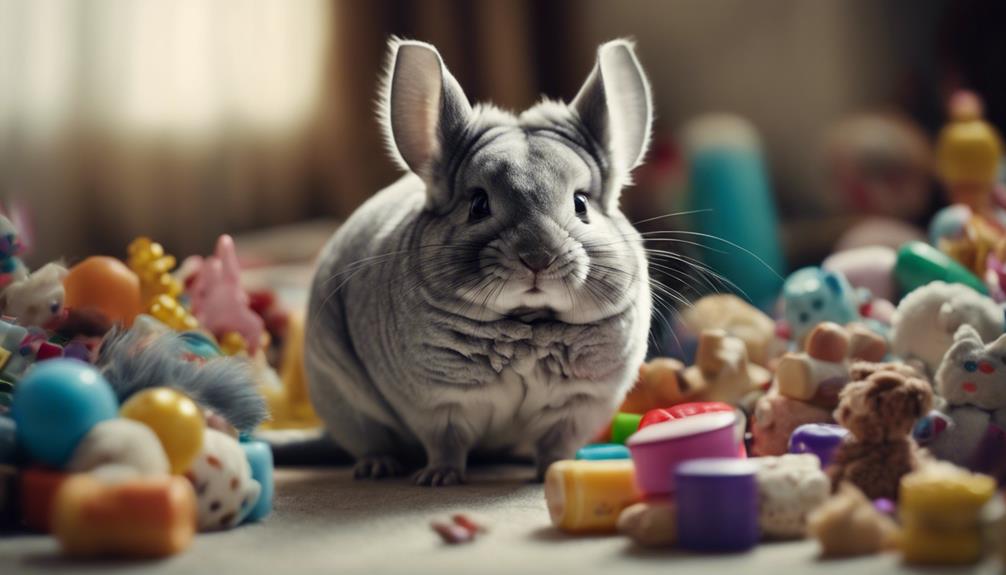
Chinchillas are social animals that thrive on companionship, so it is recommended to have at least two chinchillas to keep each other company.
Chinchillas have a very dense and soft fur coat, which they clean by taking dust baths.
Proper diet for chinchillas includes high-quality hay, pellets, fresh water, and occasional treats like fruits and vegetables.
Chinchilla Lifespan Overview
The average lifespan of domestic chinchillas typically ranges from 10 to 15 years, making them long-lived pets in the rodent family. When considering chinchilla breeding, it's essential to understand that female chinchillas can start reproducing as early as 8 months old. However, it's generally recommended to wait until they're around 1 year old to breed to ensure their optimal health. Breeding chinchillas should be done responsibly, taking into account factors like genetics, age, and overall well-being.
In terms of chinchilla behavior, these adorable creatures are known for their social nature. They thrive on interaction and companionship, often enjoying the company of other chinchillas. It's crucial for chinchilla owners to provide ample opportunities for exercise and mental stimulation to prevent boredom and promote a healthy lifestyle. Understanding chinchilla behavior can help create a harmonious environment for these fascinating animals, enhancing their overall well-being and longevity.
Factors Affecting Chinchilla Longevity
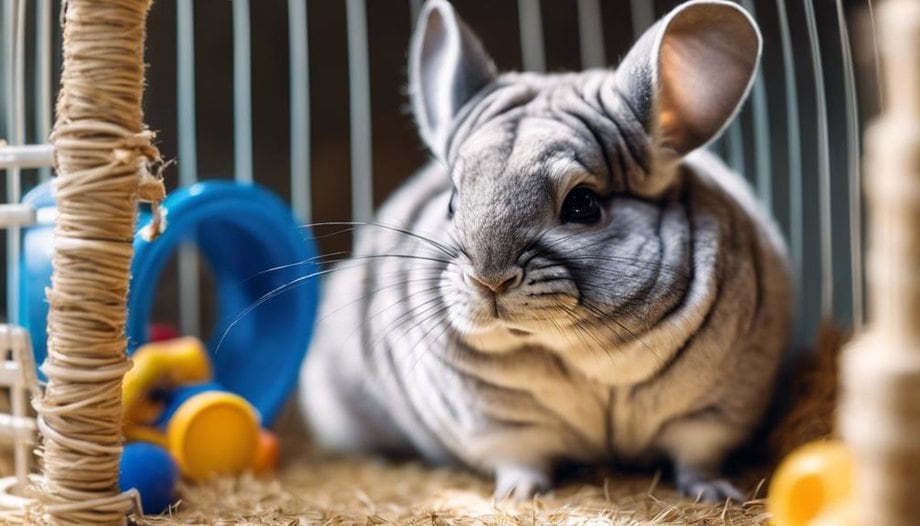
Factors affecting a chinchilla's longevity include genetics, nutrition, and care. Genetics play a significant role in determining a chinchilla's lifespan, as certain genetic factors can predispose them to health issues.
Proper nutrition and attentive care also greatly impact how long a chinchilla can live a healthy and happy life.
Factors for Longevity: Genetics
Genetics play a significant role in determining the lifespan of domestic chinchillas. Genetic influences can impact various longevity factors, affecting how long a chinchilla may live. Understanding the genetic background of a chinchilla can provide insights into its potential lifespan. Here is a table outlining some genetic factors that can influence chinchilla longevity:
| Genetic Factor | Description | Impact |
|---|---|---|
| Inherited Diseases | Presence of hereditary conditions | Can shorten lifespan if not managed appropriately |
| Breeding Practices | Selective breeding for health and vitality | Can promote longer lifespan with healthier offspring |
| Genetic Diversity | Genetic variation within the chinchilla population | Greater diversity may lead to enhanced overall resilience |
| Longevity History | Ancestral lifespan records | Longer-lived ancestors may indicate potential for longevity |
Understanding these genetic factors can help chinchilla owners make informed decisions to support their pets' long and healthy lives.
Nutrition and Care
Exploring the impact of proper nutrition and care on chinchilla longevity reveals essential practices for ensuring their well-being and longevity. Chinchillas require a balanced diet and specific care routines to thrive. Here are key factors affecting chinchilla longevity:
- Nutritional balance: Providing a diet rich in high-quality hay, chinchilla pellets, and fresh water is crucial for their health.
- Behavioral enrichment: Offering chew toys, dust baths, and opportunities for exercise promotes mental stimulation and physical well-being.
- Regular veterinary check-ups: Monitoring their health and addressing any issues promptly can prolong their lifespan.
- Proper housing: A spacious cage with plenty of ventilation and hiding spots is essential for their comfort.
- Clean environment: Regularly cleaning their cage and ensuring good hygiene minimizes the risk of infections.
Typical Lifespan Expectations
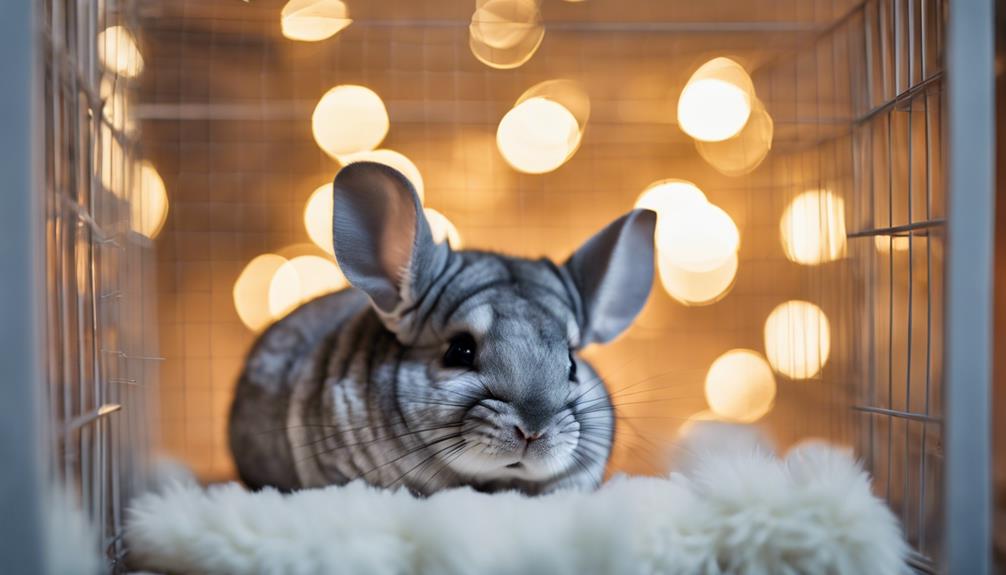
Understanding the typical lifespan of domestic chinchillas can provide valuable insights for owners seeking to ensure their pets' well-being and longevity. Lifespan variations in chinchillas are influenced by several factors, including genetics, diet, environment, and overall healthcare. On average, domestic chinchillas can live between 10 to 20 years, with some reaching even older ages in optimal conditions. The aging process of chinchillas is gradual, with signs such as decreased activity levels, changes in appetite, dental issues, and potential fur loss becoming more prominent as they get older.
Proper care, regular veterinary check-ups, a balanced diet, and a suitable living environment can all contribute to extending a chinchilla's lifespan towards the higher end of the spectrum. Owners should be mindful of their chinchilla's age-related needs and make adjustments to their care routines accordingly. By understanding the aging process and potential lifespan variations, owners can better cater to their chinchilla's changing requirements as they grow older.
Health and Diet Impact
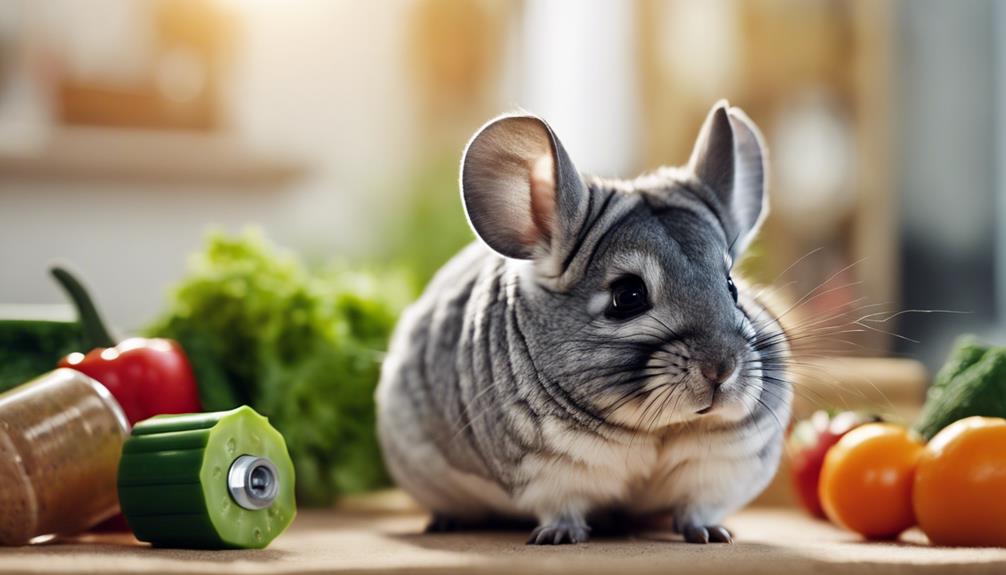
Chinchillas' health and diet play crucial roles in determining their lifespan. Proper nutrition and regular exercise are essential for maintaining their well-being and longevity.
Understanding common health issues can help chinchilla owners provide the best care for their furry companions.
Diet and Health
Maintaining a balanced diet is crucial for the overall health and well-being of domestic chinchillas. To ensure their optimal health, chinchillas require specific dietary considerations, including:
- Proper Dental Health: Chinchillas' teeth continuously grow, so a diet rich in hay helps wear down their teeth naturally.
- Weight Management: Obesity can lead to various health issues, so it's essential to provide a diet that helps them maintain a healthy weight.
- Nutrient-Rich Pellets: High-quality chinchilla pellets are vital to meet their nutritional needs.
- Fresh Water: Access to clean, fresh water is essential for chinchillas' overall health.
- Limited Treats: While treats can be a fun addition, they should be given sparingly to prevent nutritional imbalances.
Exercise Requirements
To ensure the optimal health and well-being of domestic chinchillas, incorporating regular exercise into their routine is essential for maintaining a balanced diet and overall health. Exercise benefits these small mammals by providing mental stimulation, preventing obesity, and promoting cardiovascular health.
Chinchillas are naturally active animals that require opportunities for playtime and socialization. Encouraging physical activity not only helps them to stay fit but also enriches their lives by mimicking their natural behavior in the wild. Setting up a safe play area with toys and tunnels can motivate chinchillas to exercise and explore.
Additionally, interacting with them during playtime provides valuable bonding experiences and mental stimulation, contributing to their overall happiness and well-being.
Common Health Issues
Common health issues impacting domestic chinchillas often stem from imbalanced diets and inadequate exercise routines. Proper weight management and dental care play a crucial role in maintaining their overall well-being. Additionally, focusing on fur health and parasite prevention is essential to prevent common health issues in chinchillas. Here are some key factors to consider:
- Weight Management: Ensuring chinchillas maintain a healthy weight through a balanced diet.
- Dental Care: Providing appropriate chew toys to prevent dental problems.
- Fur Health: Regular grooming to prevent matting and skin issues.
- Parasite Prevention: Using veterinarian-approved methods to prevent parasites.
- Exercise Routine: Encouraging physical activity to promote a healthy lifestyle.
Tips for Prolonging Lifespan
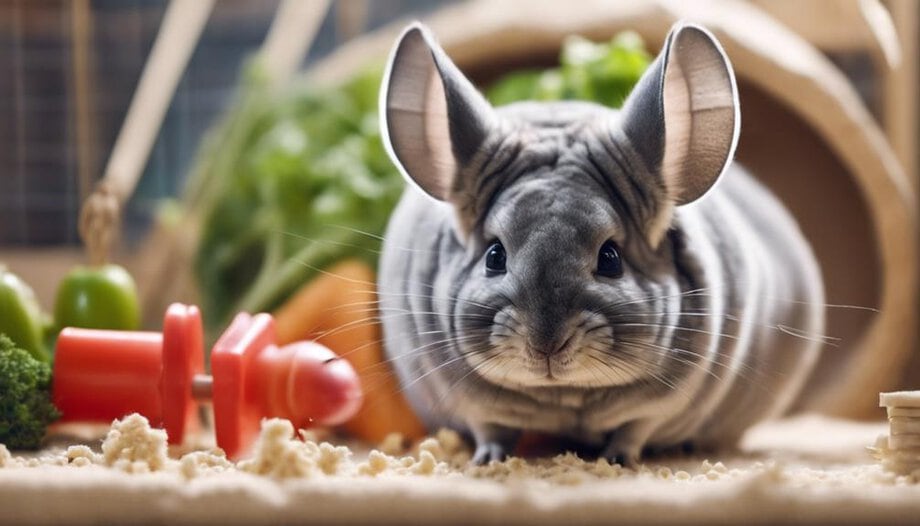
Incorporate these key principles for enhancing the longevity of domestic chinchillas. Providing enrichment activities is crucial for keeping chinchillas mentally and physically stimulated. Offer them toys to play with, safe items to chew on, and opportunities for exercise to prevent boredom and promote overall well-being.
Ensuring a suitable environment is equally important. Maintain proper cage hygiene, provide adequate space for movement, and regulate temperature and humidity levels to create a comfortable living space for your chinchilla.
Regular veterinary checkups are essential for detecting any health issues early on. Schedule routine visits with a knowledgeable exotic animal veterinarian to monitor your chinchilla's health and address any concerns promptly.
Grooming is another key aspect of chinchilla care. Brush their fur gently to prevent matting and hairballs, trim their nails regularly, and keep their teeth in check with appropriate chew toys.
Recognizing Signs of Aging
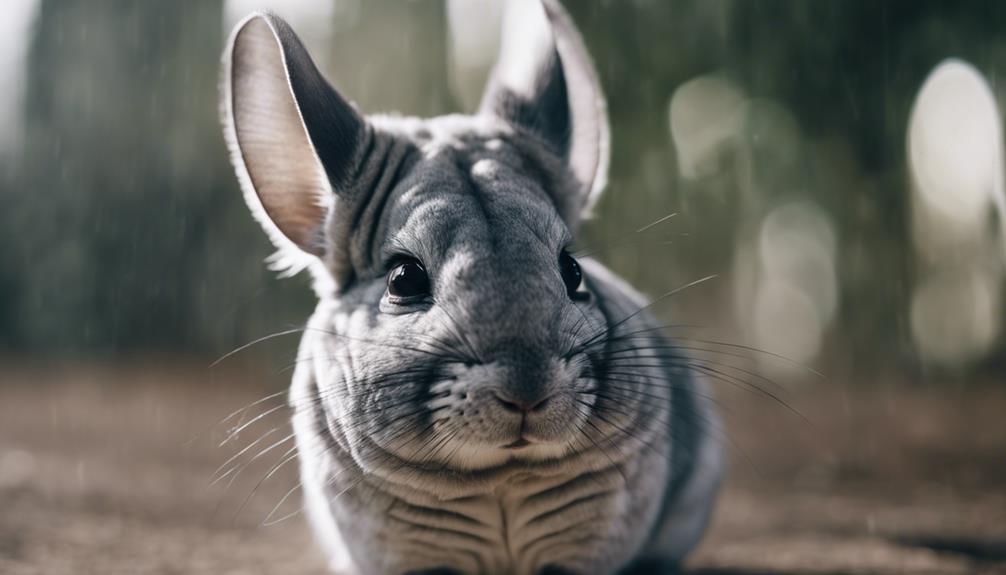
As domestic chinchillas age, there are specific signs that owners should be vigilant in recognizing to ensure the well-being and health of their furry companions. Signs of decline and age-related changes can manifest gradually, requiring careful observation from the owner.
Here are some key indicators to watch for:
- Changes in Activity Level: A decrease in overall activity or reluctance to engage in play can signal aging in chinchillas.
- Weight Loss: Sudden or noticeable weight loss could indicate underlying health issues associated with aging.
- Dental Problems: Older chinchillas may experience dental issues, leading to difficulty in eating or drooling.
- Fur Changes: The quality of the fur may deteriorate, becoming thinner or looking unkempt due to age-related factors.
- Behavioral Changes: Shifts in behavior such as increased aggression, confusion, or disorientation can be linked to the aging process.
Quality of Life Considerations
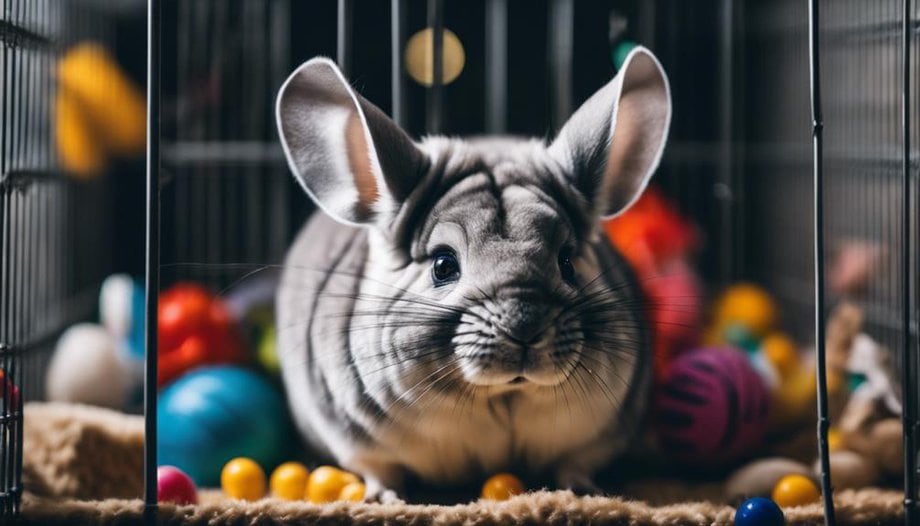
Considering the overall well-being of aging domestic chinchillas involves assessing various factors to ensure their quality of life remains optimal.
Enrichment activities play a crucial role in maintaining mental stimulation for older chinchillas. Providing puzzles, interactive toys, and opportunities for exploration can help keep their minds active and engaged.
Social interactions are equally important for chinchillas, even as they age. Encouraging gentle interactions with their human caregivers or introducing them to compatible chinchilla companions can prevent loneliness and promote overall well-being.
Environmental enrichment is another key aspect to consider. Creating a stimulating environment with hiding spots, climbing structures, and safe chew toys can enhance their quality of life.
It's essential to monitor their behavior and adjust enrichment activities based on their preferences and abilities as they age. By prioritizing mental stimulation, social interactions, and environmental enrichment, caregivers can help aging domestic chinchillas lead fulfilling lives.
Frequently Asked Questions
Can Chinchillas Live Outdoors All Year Round?
Chinchillas can live outdoors all year round with proper outdoor housing and winter care. While indoor living offers more control over temperature and safety, some chinchillas thrive in outdoor environments, benefiting from natural light and space.
Do Chinchillas Require Special Veterinary Care as They Age?
As chinchillas age, geriatric care becomes essential. Senior chinchillas may require special veterinary attention and preventative measures to address potential health concerns. Regular check-ups, appropriate diet adjustments, and monitoring for age-related issues are crucial.
Are There Any Specific Supplements That Can Help Increase a Chinchilla's Lifespan?
To increase a chinchilla's lifespan, dietary requirements should include quality pellets, hay, and occasional treats. Regular exercise and enrichment activities are vital for their well-being. These practices promote longevity and overall health in domestic chinchillas.
How Can I Ensure My Chinchilla Has a Good Quality of Life in Their Later Years?
To ensure a chinchilla has a good quality of life in their later years, focus on enriching their environment with stimulating activities and meeting their nutritional needs. Incorporate regular exercise routines and provide opportunities for social interactions to promote their well-being.
Can Chinchillas Develop Age-Related Health Issues Like Arthritis or Cataracts?
As chinchillas age, they might encounter health issues like arthritis or cataracts. Proper nutrition requirements and engaging exercise routines can help mitigate these concerns. Regular veterinary check-ups are essential to address any age-related health challenges promptly.


